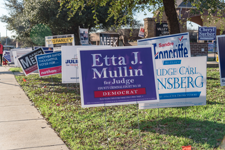 [As written by Rip Van Winkle on June 15, 2021]
[As written by Rip Van Winkle on June 15, 2021]
In early March 2020, I fell asleep upon drinking my favorite beverage on a California beach. When I awoke today on June 15, 2021, I am surprised to see people celebrating in the streets and face masks in the trash. Home prices are sky high and the cost of a gallon of gas is near $5. What happened during my slumber?! Everything looks normal to me – but is it? Help!
On June 15, 2021, the state of California fully reopened under the New Normal. According to the state’s web site, Governor Newsom terminated “the executive orders that put into place the Stay Home Order and the Blueprint for a Safer Economy.” Previously, it noted that beginning June 15, 2021, all sectors listed in the current Blueprint Activities and Business Tiers Chart may return to usual operations…” How will the state’s reopening plan affect HOAs throughout the state? The purpose of this article is to briefly summarize what some have described as the New Normal – and to address whether HOAs can reopen without restrictions.
The New Normal
COVID-19 continues to be present in smaller numbers throughout the state. The Centers for Disease Control (“CDC”) states that some vaccinated people will still get sick because “no vaccines are 100% effective” and provides that it is “still learning how long COVID-19 vaccines protect people.” Data suggests that some California citizens remain unvaccinated. As of June 17, 2021, the California Department of Public Health (“CDPH”) maintains that the “risk for COVID-19 exposure and infection will remain until we reach community immunity from vaccinations, especially in communities heavily impacted by COVID-19.”
Now that the state will no longer be subject to the state’s COVID-19 health guidelines, does that mean that HOAs can return to pre-COVID operations under the New Normal without regard to prior and existing health recommendations? Not necessarily.
Since the Governor’s March 2020 Executive Order, the state has largely deferred to health mandates imposed by local counties. While the state may have lifted its Blueprint for a Safer Economy, it is possible that some counties may continue to impose COVID-19 limitations for their local populations based upon their respective COVID-19 metrics. “Nothing in this Order shall be construed to limit the existing authority of local health officers to establish and implement public health measures within their respective jurisdictions that are more restrictive than…the public health measures imposed on a statewide basis pursuant to the statewide directives of the State Public Officer.” (Executive Order N-07-21 dated June 11, 2021). Accordingly, it is advisable for HOAs to review local requirements before deciding to resume pre-COVID business (i.e., reopening facilities and holding in-person Board meetings, among other things).
The state’s decision to fully reopen potentially creates confusion regarding the application of health guidelines and safe practices. Fortunately, the Centers for Disease Control (“CDC”) provides a default framework for community associations to evaluate as they reopen throughout the state.
Liability Considerations
During the New Normal, boards of directors and management professionals should not overlook the CDC’s COVID-19 guidance, particularly because reviewing that material could help to prevent liability exposure for the Association. The CDC provides guidance for shared or congregate housing, and multifamily housing (e.g., condominiums and townhouses). The principles from those resources could apply to resident gatherings within community associations, such as in-person board meetings and community events. The CDC web site includes COVID-19 instruction for many daily activities that are fixtures within HOA communities, such as gyms or fitness centers, playgrounds, and pools. HOAs would be well served by considering the adoption of safeguards which appreciate the CDC’s guiding principles in those contexts (i.e., encouraging social distancing and mask wearing; sign posting; and resident education, etc.) because the landscape in 2021 is much different than it was in 2019.
Community associations possess the obligation to discharge their legal responsibilities in accordance with certain standards of care. They can be responsible for harms to third parties if their conduct is considered to be negligent by acting or by failing to act (CACI 400). Negligence is defined as “conduct which falls below the standard established by law for the protection of others against unreasonable risk of harm.”(Restatement Second of Torts, section 282). In general, one is required to exercise the care that a person of ordinary prudence would exercise under the circumstances. The California Supreme Court held the following: “Because application of [due care] is inherently situational, the amount of care deemed reasonable in any particular case will vary, while at the same time the standard of conduct itself remains constant, i.e., due care commensurate with the risk posed by the conduct taking into consideration all relevant circumstances (Flowers v. Torrance Memorial Hospital Medical Center (1994) 8 Cal.4th 992, 997).
Notwithstanding the state’s reopening, the amount of care now exercised by HOAs might require a greater appreciation or awareness of safe procedures, in view of the present COVID-19 risk and current health standards. CDC and state/local guidelines, to the extent available, provide detailed guidance that can be considered in that regard. Below are suggested practices for some common HOA functions:
|
HOA Function
|
Recommended Practice |
| Indoor Board Meetings |
Face Mask Coverings – see CDPH’s “Guidance for the Use of Face Coverings – Effective June 15, 2021”, or applicable County guidelines, whichever is stricter. Click here for our recent blog post regarding face mask coverings.
Holding Gatherings – see CDC guidance. |
| Maintenance of Common Area Amenities |
Continuance of enhanced cleaning and disinfection practices – beyond those practices in place before the March 2021 Stay at Home Order.
Maintaining Healthy Environments – see CDC Guidance. |
 |
Rejoice! It looks like we may be close to the light at the end of the tunnel. Much has changed since I fell asleep. What appears to be normal may not be. I know that I can ask my trusted HOA lawyer for assistance as I take measures to protect my community – but maybe not at the beach… RVW |
-Blog post authored by TLG Attorney, Kumar S. Raja, Esq.

 HOA Lawyer Blog
HOA Lawyer Blog




 The rising cost of electricity, environmental considerations, clean energy and tax savings, utility company programs designed to help alleviate the demand on the grid, and the proliferation of affordable residential solar energy systems have made solar power more popular than ever. Consequently, Associations are seeing a sharp rise in homeowner requests to install solar energy systems. This presents a particularly unique set of challenges for condominium developments because of their shared roofs and other similar common area components.
The rising cost of electricity, environmental considerations, clean energy and tax savings, utility company programs designed to help alleviate the demand on the grid, and the proliferation of affordable residential solar energy systems have made solar power more popular than ever. Consequently, Associations are seeing a sharp rise in homeowner requests to install solar energy systems. This presents a particularly unique set of challenges for condominium developments because of their shared roofs and other similar common area components. Children are usually considered blessings and a joy to be around. Unfortunately, there is always one slightly rambunctious child who may be prone to causing trouble in Homeowners Associations (“HOAs”). What should an HOA and/or Board of Directors (“Board”) do in such scenarios? Is there anything the HOA can legally do?
Children are usually considered blessings and a joy to be around. Unfortunately, there is always one slightly rambunctious child who may be prone to causing trouble in Homeowners Associations (“HOAs”). What should an HOA and/or Board of Directors (“Board”) do in such scenarios? Is there anything the HOA can legally do? It is becoming increasingly popular to raise chickens in suburban and even in urban areas. Chickens offer a continuous source of fresh eggs and arguably help with pest control. Conversely, chickens can be loud, messy, attract coyotes, and arguably are best suited for rural, country life. Because many municipalities have legalized raising chickens in residential zones, HOAs are more frequently encountering owners maintaining chickens in their communities, some even allowing their chickens to roam the common area alongside the family dog.
It is becoming increasingly popular to raise chickens in suburban and even in urban areas. Chickens offer a continuous source of fresh eggs and arguably help with pest control. Conversely, chickens can be loud, messy, attract coyotes, and arguably are best suited for rural, country life. Because many municipalities have legalized raising chickens in residential zones, HOAs are more frequently encountering owners maintaining chickens in their communities, some even allowing their chickens to roam the common area alongside the family dog. *Asked and Answered
*Asked and Answered

 [As written by Rip Van Winkle on June 15, 2021]
[As written by Rip Van Winkle on June 15, 2021]